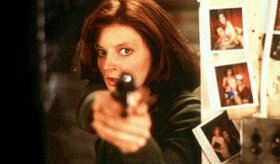|
|
| Tookey's Review |
|
| Pro Reviews |
|
| Mixed Reviews |
|
| Anti Reviews |
|
| Cast |
|
| |
 |
| |
| Released: |
1991 |
| |
|
| Genre: |
HORROR
SERIES
SEQUEL
THRILLER
|
| |
|
| Origin: |
US |
| |
|
| Length: |
120 |
|
| |
|
| |
|
|
| |
|
|
Murderous psycho Hannibal Lecter (Anthony Hopkins) helps FBI trainee Clarice Starling (Jodie Foster, pictured) track down a serial killer Buffalo Bill (Ted Levine), so named because he skins his female victims .
|
Reviewed by Chris Tookey
|
A terrific, though melodramatic, thriller with a frightening view of humanity - especially men. Jonathan Demme directs with Hitchcockian flair, but less of the old master's voyeurism and misogyny. Jodie Foster and Anthony Hopkins, both on top form, play some of the most memorable scenes in cinema history.
The film was much criticised for glorifying the serial killer. The author of the original, million-selling novel, Thomas Harris, was once a crime reporter and could undoubtedly have written a more realistic mass-murderer than Hannibal Lecter. However, the extent to which Lecter acquired a mythic status - and won Hopkins an Oscar as “leading actor” when really he was in a supporting role - suggests his decision not to was a shrewd one. Lecter is really a variation on an old cinematic theme: the evil genius, also known as Count Zaroff, Dr Frankenstein and the Phantom of the Opera.
Although Lecter is the most courteous, civilized and intelligent person in the film, he is not so clever that he understands what drives him: the result is that he also has something about him of the noble savage. There are moments when, trussed and restrained, he has the pathos of the Man In The Iron Mask or Frankenstein's Monster. His escape from custody is as ingenious as that of a James Bond, and the audience increasingly feels a sneaking sympathy for him as a free spirit. The film ends with him stalking his old jailer, and few members of the audience will not wish him “bon appetit”.
Lecter is also the sexiest man in the film. He can recognize the heroine by her walk and the smell of her skin-cream. He draws romantic pictures of her. The moment when she ventures too close and Lecter chooses just to brush one finger across hers is erotically charged, precisely because we (and she) are aware of what he could do to her. The film is, in a perverse way, a romance.
The scenes between Hopkins and Foster won Oscars for the actors because they are so well written as love-hate sparring matches, with each punching deep into the other's psyche. The key speech in the film is Hopkins's, where he compares Clarice's childhood failure to save lambs from slaughter, with her feeble attempts as a member of the FBI to fight the dark side of humanity. That such attempts are ultimately doomed is never in doubt, for both Harris's novel and Ted Tally's screenplay are steeped in a sense of original sin.
In the film, however, the sin is specifically masculine. Director Jonathan Demme goes to great lengths to emphasise Clarice Starling’s femininity. She is dwarfed physically by the men around her, and patronised or chatted up wherever she goes. Her boss chooses her to approach Lecter because she is young and pretty; and it is only because she is sexually humiliated in his presence that Lecter offers to help. Ironically, she finds the serial killer Buffalo Bill first because of her knowledge of dressmaking.
But Miss Starling, like her ornithological namesake, is also a mimic, in her case of men. When we first see her, she is sweat-stained and on an assault course. She is mechanically adept, and knows how to use a car jack. And she's no wimp: unlike your traditional heroine, she doesn't scream when she discovers the occasional severed head or decomposing corpse.
The reason why a lot of women found this the scariest film since Psycho lies in the way the external threats to Clarice reflect the conflict within her (and so many modern women) between masculine ambition and feminine vulnerability. The strength and luminous sincerity of Jodie Foster's performance allows the film-makers to get away with an almost comically extreme paranoia about the male sex.
In style, director Jonathan Demme wisely takes a more populist approach than Michael Mann did in his acclaimed but too self-consciously artistic 1986 flop Manhunter, based on Harris's previous million-seller, Red Dragon. Demme acknowledges the influence of his old mentor, Roger Corman, by allowing him on screen, briefly, as Head of the FBI. Demme's film - easily his most polished and self-assured - echoes Corman at his best, in its boldness of colour, texture and pace: two hours pass in a flash.
There are times when it is too frenetic: I would have liked more of Starling's relationship with her boss (who is, in the book, a moral counterbalance to Lecter), and more of that FBI procedural detail which makes Harris's novels seem so grounded in reality.
The film is not as frightening as you might expect, and its view of men is more fashionable than convincing. Still, it is a masterpiece of the horror genre, and explores the dark side of humanity and humanism to an extent rarely seen in the commercial cinema. The editing (Craig McKay) and sound (Tom Fleischman, Christopher Newman) were Oscar-nominated.
|
|
|
